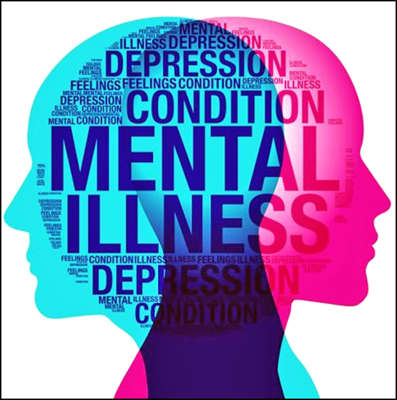
Mohammad Hanief
In the fast-changing world of the 21st century, health debates often revolve around physical fitness, nutrition, and medical treatment. Yet, there exists an equally vital pillar of human well-being that has for long remained in the shadows-mental health. It is the invisible foundation on which lives, relationships, and societies are built. Without it, physical health and social progress lose meaning.
Today, as stress, anxiety, depression, and loneliness rise at unprecedented levels, the importance of mental health can no longer be ignored. It is not merely an individual concern but a collective responsibility for families, institutions, and nations alike.
Mental health is not just the absence of mental illness. It is a state of emotional, psychological, and social well-being that enables people to cope with daily stresses, work productively, and contribute meaningfully to society. A mentally healthy person can balance emotions, think clearly, maintain fulfilling relationships, and recover from setbacks.
Unfortunately, mental health is still surrounded by stigma. In many communities, psychological struggles are brushed aside as weakness or lack of faith. This misunderstanding prevents millions from seeking help until conditions worsen. Recognizing mental health as an essential part of overall health is therefore the first step toward building healthier societies.
Doctors and researchers agree: there is no health without mental health. Stress and prolonged anxiety can trigger physical illnesses such as hypertension, diabetes, heart disease, and digestive disorders. Similarly, chronic diseases often result in depression and emotional fatigue, creating a cycle that affects both body and mind.
Workplaces today are facing a silent crisis. Stress, burnout, and mental fatigue are costing billions in lost productivity worldwide. An employee struggling with mental health cannot deliver their best. In contrast, workplaces that prioritize mental well-being benefit from higher creativity, loyalty, and efficiency.
Relationships thrive on empathy, communication, and emotional balance. When mental health deteriorates, conflicts, isolation, and breakdowns in family life become common. On the other hand, mentally healthy individuals nurture stronger families and create compassionate communities.
For children and young adults, mental health determines not only academic performance but also personality development. Bullying, exam stress, family conflicts, and peer pressure often leave lasting scars if not addressed early. Ignoring these issues can lead to dropouts, substance abuse, and in extreme cases, suicidal tendencies. Schools and colleges must therefore place mental health at the core of their educational mission.
Every year, millions of lives are lost to suicide-most preventable if mental health care had been timely and accessible. Behind each statistic is a life cut short, a family shattered, and a society burdened with irreversible loss. Suicide prevention begins with breaking the silence around mental health and ensuring that those in despair know help is available.
Despite rising awareness, mental health care faces serious obstacles. The first is stigma. Fear of being judged often silences those who need help most. Many cultures still treat mental illness as taboo, discouraging open discussion.
The second is accessibility. In developing nations especially, the shortage of psychiatrists, psychologists, and trained counsellors is alarming. Even where services exist, affordability remains a challenge, and health insurance rarely covers psychological treatment.
The third is awareness. People often fail to recognize the signs of mental distress until the condition worsens. Families sometimes dismiss symptoms as laziness, immaturity, or “just stress,” delaying much-needed intervention.
Building a mentally healthy society requires joint action by individuals, families, institutions, and governments.Community campaigns, school workshops, and workplace seminars can normalize discussions about mental health. When people learn to recognize symptoms of stress, depression, or anxiety, they are more likely to seek timely help.
Like any physical disease, mental health problems respond best to early treatment. Counselling, therapy, and stress-management techniques can prevent minor struggles from becoming lifelong conditions.
Organizations must treat employee well-being as a priority. Flexible hours, stress-relief programs, and counselling facilities can make workplaces healthier. Similarly, schools should train teachers to identify signs of distress and create safe spaces where children can share their feelings without fear.
On a personal level, good habits strengthen the mind. Balanced diets, regular exercise, adequate sleep, meditation, and engaging hobbies reduce stress and boost emotional resilience. Social connections-family, friends, and supportive networks-act as emotional anchors in times of crisis.
Governments need to integrate mental health into public healthcare systems. Increasing the number of trained professionals, setting up community counsellingcenters, and ensuring affordable therapy are crucial steps. Policies must also recognize that mental health is not a luxury but a basic right.
With the digital revolution, online counselling and tele-therapy have made mental health services more accessible. Mental health apps and support groups on social platforms are offering new avenues of help. However, excessive screen time and the pressures of social media remain challenges that must be balanced carefully.
Mental health is not just an individual issue. It is a collective responsibility that requires compassion at every level. Families must create supportive environments, communities must break stigma, employers must value employee well-being, and policymakers must invest in mental health infrastructure.
The pandemic years taught humanity an important lesson: when the mind suffers, everything else suffers. Conversely, when mental health is prioritized, individuals flourish, families strengthen, workplaces thrive, and societies progress.
The importance of mental health is no longer a subject for quiet discussions-it is a global concern that demands urgent attention. It is the invisible backbone of physical health, education, productivity, relationships, and even national development.
Ignoring mental health leads to suffering and loss. Embracing it leads to hope and healing. A society that invests in mental well-being invests in its future.It is time to move beyond stigma, recognize the silent battles people fight every day, and treat mental health with the same seriousness as physical health. Only then can we build a world where individuals are not merely surviving, but truly living.
(The author is a senior analyst)

